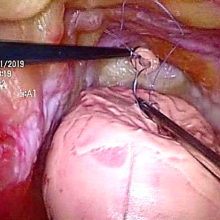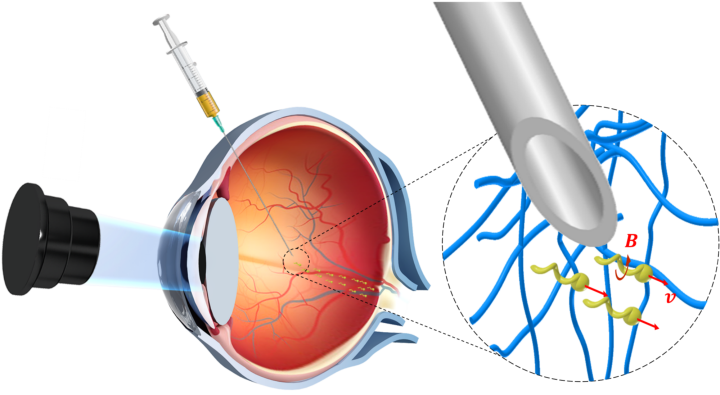Advances in minimally invasive procedures and artificial intelligence (AI) are increasingly impacting medical care. Future developments depend on a close interplay between hardware and its integration with big data and AI. We are interested in developing tools that collect large amounts of data and to learn from the data to understand the underlying principles. With close collaborations with medics, the Cyber Valley research group at the University of Stuttgart focuses on the two following aspects:
Research Focuses
Micro-/nano-robotics for biomedical applications
The recent technology advancements of micro-/nano-system engineering and robotics opens up new possibilities for the next-generation surgical robots – wireless micro-/nano-robots, which can be controlled navigate in the human body and may lead to various medical applications including drug delivery, in vivo sensing and stimulation. The team succeeded in developing the first soft microrobot that can swim in biological non-Newtonian fluids by reciprocal motion, and the first nanorobots that can penetrate real tissue – the vitreous of the porcine eye.
The group has an exciting new project "VIBEBOT" funded by the ERC Starting grant. The goal is to build the first micro-sized robot that can actively propel and wirelessly sense in deep biological tissues, which can open up enormous potential for future minimally-invasive medicine, such as targeted drug delivery for tumor therapy.
Selected publications in this area
Z. Ma, K. Melde, A.G. Athanassiadis, M. Schau, H. Richter, T. Qiu*, P. Fischer*, Spatial ultrasound modulation by digitally controlling microbubble arrays, Nature Communications,11, 4537 (2020).
T. Yu, A.G. Athanassiadis*, M.N. Popescu, V. Chikkadi, A. Güth, D.P. Singh, T. Qiu*, P. Fischer, Microchannels with Self-Pumping Walls, ACS Nano, (2020).
Z. Wu, J. Troll, H.-H. Jeong, Q. Wei, M. Stang, F. Ziemssen, S. Schnichels, T. Qiu*, P. Fischer*, A swarm of slippery micropropellers penetrates the vitreous body of the eye, Science Advances, 4, eaat4388 (2018).
T. Qiu, F. Adams, S. Palagi, K. Melde, A. G. Mark, U. Wetterauer, A. Miernik, P. Fischer. Wireless acoustic-surface actuators for miniaturized endoscopes, ACS Applied Materials & Interfaces, 9, 42536-42543 (2017).
T. Qiu, T.-C. Lee, A. G. Mark, K. I. Morozov, R. Münster, O. Mierka, S. Turek, A. M. Leshansky, P. Fischer, Swimming by reciprocal motion at low Reynolds number. Nature Communications, 5, 5119 (2014).
Highlights in the media
Dr. Qiu received ERC Starting Grant "VIBEBOT", 1.5 Million euros to research on micro-robots for minimally-invasive medicine. Press release
Dr. Qiu presented the research to German Chancellor Dr. Angela Merkel and Baden-Württemberg’s Minister-President Winfried Kretschmann: Press release
Dr. Qiu's interviews at "Made in Science" and the Cyber Valley Podcast about AI and Medicine
Organ Phantom: Südwest Presse, Stuttgarter Zeitung, Deutschland.de, Innovations Report
Micro-/Nano-robots: Nature Reserach Highlights, Science Videos, BIOPRO Baden Wüttermberg, 3SAT NANO

Tian Qiu
Dr.Independent Cyber Valley Group Leader





